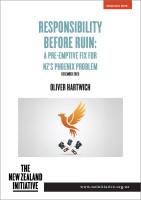From blueprints to building
After many difficult years, 2025 felt different. It was not easier. Read more

Oliver is the Executive Director of The New Zealand Initiative. Before joining the Initiative, he was a Research Fellow at the Centre for Independent Studies in Sydney, the Chief Economist at the Policy Exchange in London, and an advisor in the UK House of Lords.
Oliver holds a master's degree in economics and business administration and a PhD in Law from Bochum University in Germany.
Oliver is available to comment on all of the Initiative’s research areas.
Phone: +64 4 499 0790
After many difficult years, 2025 felt different. It was not easier. Read more
Last week, boxes of fudge arrived at New Zealand’s Parliament. Not as a festive treat, but as a political weapon. Read more
Dr Oliver Hartwich spoke with Newstalk ZB about the government's plan to merge the Ministries of Environment, Transport, Housing, Urban Development, and Internal Affairs into a new mega-ministry called MSERD. While he acknowledged the need to consolidate New Zealand's numerous government departments, Dr Hartwich expressed doubts about the timing and effectiveness of this particular merger, drawing comparisons to the challenges faced by the large and complex MBIE. Read more
In this episode, Oliver and Michael reflect on a packed 2025 that brought major policy wins in education, housing, and regulation, while looking ahead to the bigger picture challenges shaping 2026. They cover everything from the Initiative’s Dutch delegation and Prof Barbara Oakley’s visit, to the dramatic early gains in literacy and numeracy under Minister Erica Stanford, the new Resource Management Act, and the work ahead on AI, demographic change, and political polarisation. Read more
Let me state this clearly at the outset: I have never placed a bet on a greyhound. I have never owned a greyhound. Read more
In this episode, Oliver, Nick and Bryce talk about the Fast Track Approvals Amendment Bill, focusing on the use of Henry VIII clauses that allow ministers to amend legislation without full parliamentary scrutiny. The discussion examines why these powers have typically been used only in genuine emergencies, how their application in planning reform raises constitutional questions, and why the Initiative recommends clearer limits and stronger sunset provisions to protect democratic processes. Read more
Let us try a brief experiment. Here is a statement of American strategic priorities: “The United States cannot survive as a free and independent nation if a hostile power dominates any region of the world from which it could threaten the US. Read more
Last year, Inland Revenue wrote off $694.5 million in company tax debt. Much will never be recovered because the companies that owed it no longer exist – at least not in their original form. Read more
Every year, Inland Revenue writes off hundreds of millions in tax debt – $694.5 million last year alone. The money vanishes through the same predictable loopholes, exploited by the same cast of characters: directors who accumulate GST and PAYE debts, then walk away scot-free by abandoning their companies. Read more
In this episode, Eric talks to Oliver about a major loophole in New Zealand's tax system that allows some companies to accumulate PAYE and GST debts, stop filing, and effectively walk away — contributing to almost $7 billion in unpaid corporate taxes. They discuss Oliver's new research note, "Responsibility before ruin: A pre-emptive fix for NZ's phoenix problem", which examines how Germany prevents such debts from building up through automatic insolvency triggers. Read more

Walk through Wellington, and you will see plenty of empty shopfronts and shuttered cafes. Switch on the radio, and you will hear experts say this is the best time to buy a house in years. Read more

A new approach to director accountability could prevent hundreds of millions of dollars in tax debt from becoming unrecoverable by requiring directors to act early when financial distress emerges. The research note, 'Responsibility before ruin: A pre-emptive fix for NZ's phoenix problem', addresses companies that accumulate large tax debts before dissolving, sometimes only to restart under a new name. Read more
Dr Oliver Hartwich talked to Newstalk ZB on the corporate tax debt loophole that sees IRD writing off hundreds of millions of dollars annually due to the "Phoenix problem," where companies dissolve and reform under new names. Dr Hartwich highlighted Germany's solution, where directors face personal liability for tax debts if they fail to pay within 20 days or file for insolvency. Read more
Wellington (Tuesday, 2 December 2025) - A new approach to director accountability could prevent hundreds of millions of dollars in tax debt from becoming unrecoverable by requiring directors to act early when financial distress emerges, according to a research note from The New Zealand Initiative. The research note, 'Responsibility before ruin: A pre-emptive fix for NZ's phoenix problem', addresses companies that accumulate large tax debts before dissolving, sometimes only to restart under a new name. Read more
In this episode, Oliver talks to James Kierstead and Damien Grant about James's departure from New Zealand after 12 years, reflecting on his journey from academia to policy research and his observations of New Zealand's cultural and political shifts since 2013. They discuss the challenges facing New Zealand universities, including grade inflation and administrative bloat, alongside broader themes of democracy, academic freedom, and the tension between New Zealand's liberal traditions and parochial tendencies. Read more